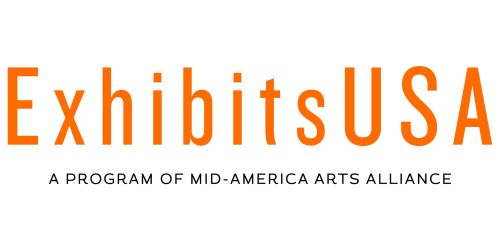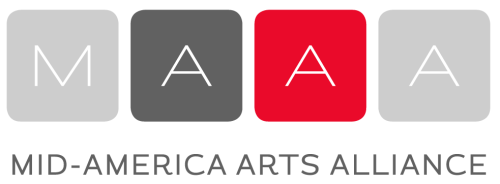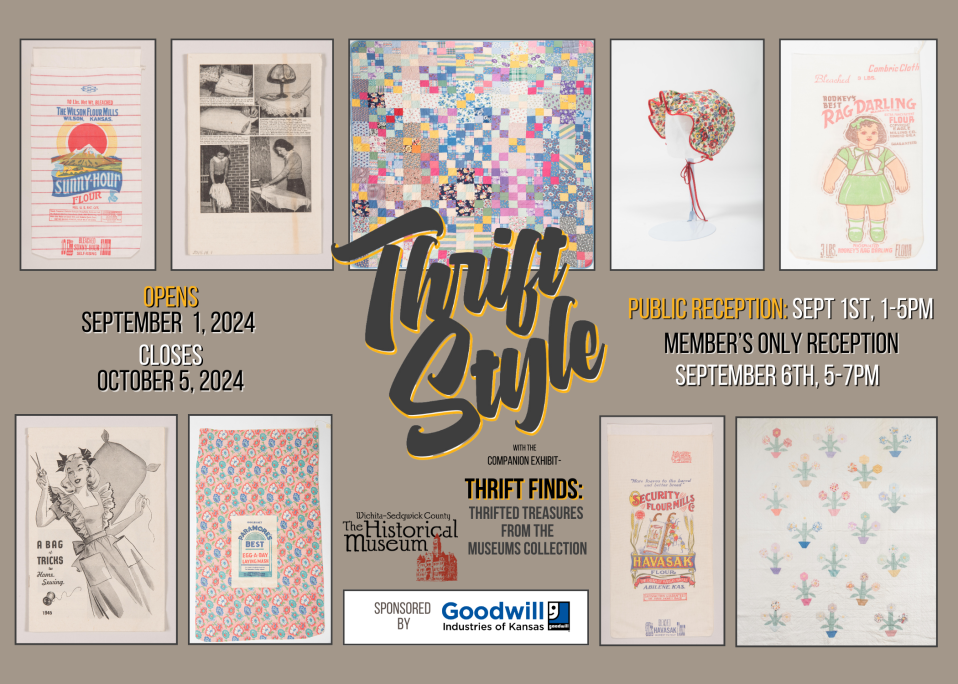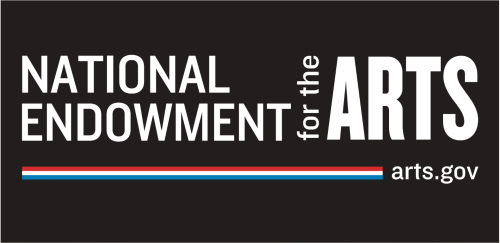Main Exhibit: Thrift Style (Located in the West Gallery- 2nd Floor)
Thrift Style explores the reuse of feed sacks to make clothing and other household objects and illuminates how the “upcycling” of these bags mutually benefitted twentieth-century consumers and businesses. With forty-one works from patterns to garments, it serves as an example of past ingenuity that can inform today’s efforts towards sustainability.
The exhibition, organized by the Historic Costume and Textile Museum and the Marianna Kistler Beach Museum of Art, both at Kansas State University, provides a nostalgic view into American ingenuity, sensibility, and optimism during a particularly challenging time of economic hardship and war—the period of the Great Depression and World War II. The reuse of feed, flour, and sugar sacks was a cost-saving and resource-saving approach employed by homemakers to make new items to meet their families’ needs.
In the 1920s and ‘30s, manufacturers began producing patterned and colored feed sacks to give home seamstresses more options. During World War II, the federal government limited fabric use for individual garments and homemakers were obligated to use thrifty approaches to repurpose what was available to them. As fabrics from feed sacks were not considered a limited resource, women turned to them as an accessible and patriotic option during the war effort. In response, trade organizations and manufacturers promoted the thrifty use of feed sack fabric by publishing how-to brochures and booklets with clothing designs, mending instructions, and other suggestions for restyling clothes.
The artifacts in the exhibition demonstrate a mutual goal of sustainability, with local businesses—mills and feed and seed operations—tailoring product design and marketing campaigns to attract customers; and consumers using their imaginations and practical skills to tailor clothing, aprons, quilts, dolls, and more out of the industry’s byproduct: feed sack cotton.
This exhibition offers a snapshot of domestic life during this time, when recycling was as critical as it is today, and it provides one of the best examples of upcycling in our nation’s history.
Thrift Style is organized by The Historic Costume and Textile Museum and the Marianna Kistler Beach Museum of Art, both at Kansas State University, and ExhibitsUSA, a program of Mid-America Arts Alliance.
https://eusa.org/exhibition/thrift-style/
Companion Exhibit: Thrift Finds: Thrifted Treasures from the Museum’s Collection (Located in the Lois Kay Walls Gallery – 3rd Floor)
Museums acquire objects in many ways, including purchases from thrift stores. Thrift stores sell donated used or second-hand items to the public at moderate prices, often as a way to support charitable organizations or causes. By promoting green practices, encouraging the re-use of items, and providing funds and services to underserved audiences, thrift stores support the community in important ways – and you never know what you’ll find at a thrift store! Created as a companion to Thrift Style, Thrift Finds features thrifted treasures from the Museum’s Permanent Collection.
———————————————–
Check out our upcoming “Thrift Style” programs, events, and workshops!
September 1st – Public Reception
September 6th – Members Only Reception (Not yet a member? Click HERE to learn how to become one today! )
September 8th – Drop-in Program: Sew A Charm
September 14th – Sewing Workshop
September 25th – Senior Wednesday – “Waste Not, Want Not: Reimagining Fashion Through Thrift Style”
———————————————–
THANK YOU to Goodwill Industries of Kansas for sponsoring this exhibit
And a special thank you to our individual sponsors:
Steven Overstreet
Alice Smith
The Family of Kenneth E. Gerhardt
About ExhibitsUSA:

This exhibition is toured by ExhibitsUSA, a national program of Mid-America Arts Alliance. ExhibitsUSA sends more than twenty-five exhibitions on tour to over 100 small and mid-sized communities every year. These exhibitions create access to an array of arts and humanities experiences, nurture the understanding of diverse cultures and art forms, and encourage the expanding depth and breadth of cultural life in local communities. For more about ExhibitsUSA, email MoreArt@maaa.org or visit www.eusa.org.
About Mid-America Arts Alliance:

Mid-America Arts Alliance (M-AAA) strengthens and supports artists, cultural organizations, and communities throughout our region and beyond. Additional information about M-AAA is available at www.maaa.org.



